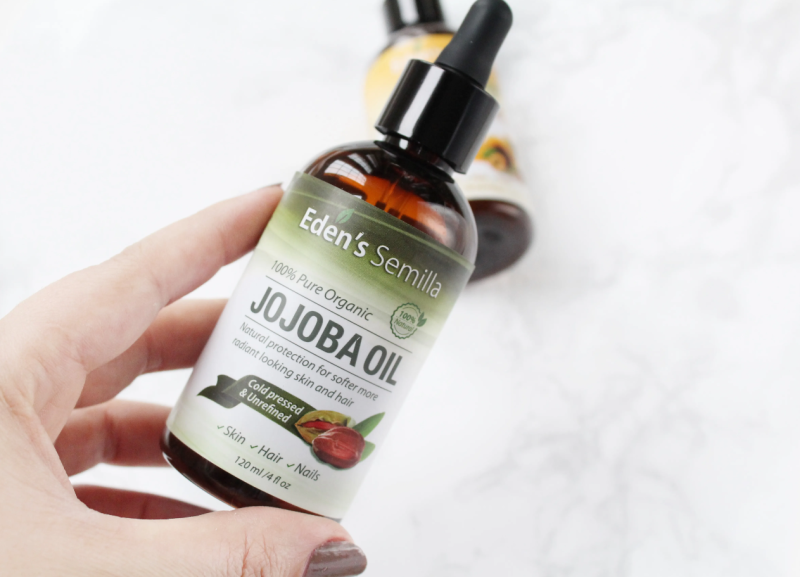
The benefits of jojoba oil for skin and hair are becoming increasingly popular. This natural product comes from the seeds of the jojoba plant ( Simmondsia chinensis), native to the southern United States and northern Mexico.
Its particular bright gold color characterizes it, although some refined presentations tend to be lighter. In turn, it stands out for its long duration since it does not oxidize or acquire foul odors, as with other vegetable oils.
Contents
What is jojoba oil?
The term “jojoba oil” can be misleading since the compound is not an oil. Contrary to its liquid and transparent appearance, it is wax. It is extracted from the jojoba plant’s ripe seeds, the only species capable of synthesizing liquid resin.
From a structural perspective, jojoba oil is similar to sperm or whale oil. For this reason, during the last third of the previous century, it was outlined as a replacement for it, given the protection policies towards the marine mammal.
Although the plant is native to North America (the United States and Mexico), it is currently cultivated in different parts of the world. Countries like Chile, Argentina, and Egypt have explored their cultivation and manufacture in recent years. Due to its particular structure, it is used in the chemical industry and the production of pharmaceutical products.
Uses and Properties of jojoba oil in Cosmetics
Today, jojoba oil is used in cosmetic formulations such as sunscreens and moisturizers. It also manufactures shampoos, lipsticks, makeup, and body creams. However, many prefer to use it naturally for skin and hair care.
Likewise, it is considered a soft oil; it can be a carrier of other essential oils. Therefore, it can be applied accompanied or by itself without significant problems.
However, anecdotal data reveals specific properties and benefits of jojoba oil for skin and hair. So far, no solid evidence supports some of the effects attributed to this product.
Due to this, it should not be considered a dermatological treatment nor a product with exceptional properties. Included in the cosmetic routine, it can serve as an adjuvant for hair or facial beautification and the rest of the body’s skin.
Six benefits of jojoba oil for the skin
We have already warned that many of the benefits of jojoba oil have only widespread endorsement. Leaving aside its industrial use, it has been used primarily for skin health. We have compiled six services and properties that the oil or wax extracted from the jojoba plant can give you in general skin well-being.
1. It can help moisturize the skin
Jojoba oil contains oily compounds, such as ceramides, which help keep skin hydrated and healthy. In addition, it is composed of nanostructured lipids that are thought to reduce transepidermal water loss.
The exciting thing about this oil is that it does not feel greasy when applied in small amounts. In addition, it is suitable for dry and combination skin. It can be used up to twice a day, as needed. Excessive use should be avoided, as animal models have suggested they can be absorbed transdermally.

2. It can reduce the risk of premature aging
According to experts, the different compounds in the oil can positively impact the premature aging of the skin. This does not mean that it completely prevents the appearance of wrinkles and others, but it can help prevent them from appearing ahead of time. Usually, the latter occurs from exposure to ultraviolet (UV) rays.
3. Integrates anti-inflammatory properties of the skin
In an investigation disclosed through the International Journal of Molecular Sciences, it is commented that jojoba wax has an anti-inflammatory effect that is positive for some skin conditions. The cited study also suggested that it may slightly affect skin barrier repair.
4. It can help in the treatment of acne
A clinical trial published in Complementary Medicine Research found that this oil is antimicrobial and may help inhibit the growth of acne-causing bacteria. However, it should be used as an adjuvant since it has not been accepted as a first-line treatment. Also, it seems to be more effective in mild cases of acne.

5. It can be helpful in healing wounds
A study published in the Journal of Ethnopharmacology evaluated the effect of jojoba oil on the mechanisms that mediate wound repair. The researchers found that its extract accelerates the closure of wounds, both keratinocytes and fibroblasts. They also determined that it can stimulate collagen synthesis.
6. It can help in the treatment of psoriasis
This is suggested by a systematic review published in Polymers in 2021. It is thought that the improvement in skin symptoms is obtained through a positive keratoplastic and keratolytic effect that mediates excessive skin desquamation. It is not a primary therapy, far from it, but it is a suitable adjuvant.
Jojoba oil benefits hair.

The benefits of jojoba oil are used in manufacturing hair care products. The reason? Its nutritional composition, in addition to its antimicrobial and antifungal properties, help maintain healthy and hydrated hair. A review published in Biological Research highlights that this product acts positively against various pathogens.
In particular, it has antibacterial, antiproliferative, and antifungal activity, which can help prevent dandruff and scalp infections. Like other jojoba oil benefits, its effect ranges from mild to moderate and is not a substitute for primary therapy.
Nowadays, it is straightforward to find shampoos, conditioners, and other hair products with jojoba oil. Its inclusion is relatively recent, and given that the interest of scientists is also current, its actual impact on hair health has yet to be seen. With these reservations in mind, the apparent benefits of jojoba oil for hair are as follows:
- It can act as a hair sealant. That is, those who apply it ensure it can help keep moisture in the strands longer.
- It helps prevent hair frizz. An effect that, in part, is achieved through the previous benefit.
- Improves combing, brushing, or general hair management. Something that can be useful for people with thick or curly hair.
- You can avoid breaking the strands. Another property that, although it does not have scientific support, has contributed to the popularity of the oil as a hair ingredient.
It is well-established that jojoba oil is chemically similar to human sebum. Capillary sebum contributes to the general health of the hair, so in theory, products with this oil can be helpful in people with little natural production. Again, there are no studies on this; all these properties only have anecdotal support.
How to use jojoba oil?
We have already mentioned that jojoba oil is used as a base or carrier oil. Unlike other oils, it is unnecessary to dilute it to tone down its effect on the skin or hair. You can take advantage of it directly, and the best way to do it is through gentle massages with a spoonful of warm oil.
Another way to use jojoba oil is by diluting several drops (no more than 5) on your skin creams and hair products. Make sure they mix well, then use these as regularly as usual. Of course, your third option is to buy from your trusted distributor products containing it as a primary or secondary agent.
Considerations before using jojoba oil on the skin and hair
In general, jojoba oil is safe for the skin and hair. Even so, especially if it’s the first time you’re using it topically, it’s best to do a patch test. Making it easy: you only have to apply a drop or two on your forearm. Wait about 45 minutes and see if it becomes red, swollen, or classic allergy symptoms appear, such as itching.
Another consideration to keep in mind is to avoid using it excessively. It is not a miraculous product; as we have warned, its effects are modest. We recommend that you be reserved with its use during the first interactions. Then, you can use it as a home and natural therapy several times a year.
Jojoba oil: an ally in your beauty routine
The occasional use of jojoba oil can be helpful to complement the beauty routine. It is not a dermatological treatment but can be an adjunct to some skin conditions. If you have doubts, do not hesitate to consult a dermatologist to resolve them.